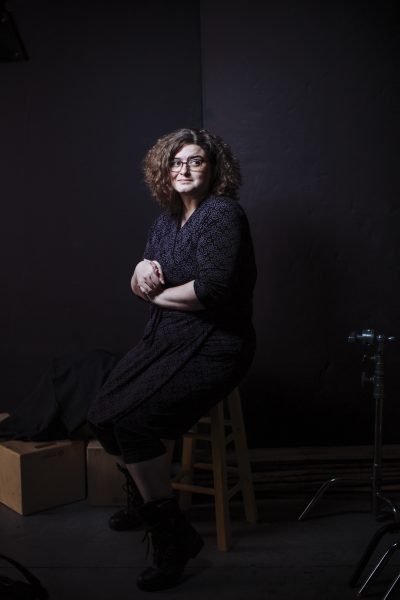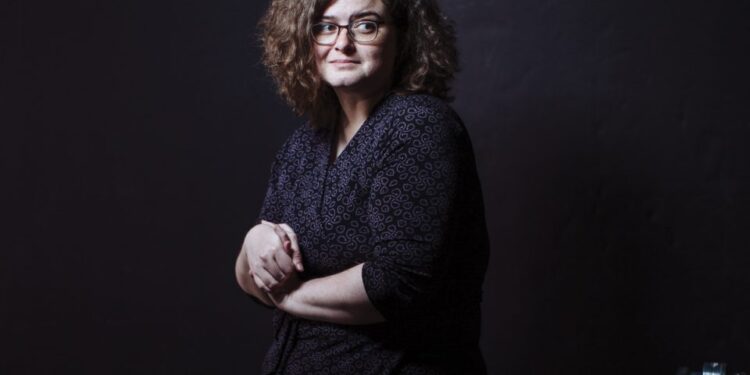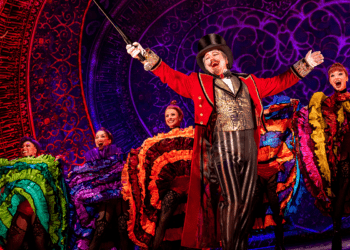Thirty-year-old Jennifer Castello lives by a simple philosophy: “Art is power.” As a writer, educator, and actor, the Omaha native has tapped into all areas of her deep imagination to carve out her path. She unequivocally believes creativity was put here to bring out a person’s voice, and that’s exactly what she’s doing.
“I think art has worked best when someone isn’t being listened to, then grabs the audience by the scruff of the neck, and through art that person says, ‘Shut up and look,’” she says. “When I’m teaching, it’s not about me. It’s about making sure that at the end of the session, residency, or workshop, the students are equipped to express themselves—be it in a story, in a song, or just in everyday life. Art is self-advocacy. Art is power. Art is resistance.”
Castello began her writing career at the ripe age of 4, when her grandmother discovered how often she was coming up with original stories.
“She pulled out a stack of papers, stapled them together, and told me to make a book,” she recalls. “The pride she took in the stories I told her made me feel like it was something special to be a writer. She was a teacher, and it was also through her and that pride that I realized I wanted to be a teacher, and make some other kid feel just as special as she made me feel.”
At 18 years old, Castello scored her first teaching job, participating in the Teacher Academy Project program at the University of Nebraska-Omaha, and eventually got her teaching license. Now, she freelances at a variety of local organizations, including the Omaha Community Playhouse.
“I go out into schools and community spaces and engage students in creating something,” she explains. “If that’s creating a clever way to win a drama game, learning how to make their own characters with makeup on their faces, or write their very own script, that’s where my heart is. When I was a kid in Omaha, teachers reached out to me and taught me that my brain had a purpose and a worth, and I’m always trying to pay it forward.”
In terms of her acting, Castello credits her father.
“He signed me up for a class at the Emmy Gifford Theatre,” she says. “Then when the Emmy Gifford turned into The Rose, he made me audition for one of the main stage plays and I got in. It was a community for me to hold onto when things got rough, and I’ll forever be grateful for that community.“
As an author, the Central High School grad was compelled to write The Messiah of Howard Street when she was still an undergrad at DePaul University in Chicago. It was inspired by the colorful characters that have become a staple of the Old Market district.
“I had read My Antonia in my American English class,” she explains. “This wasn’t the first time I read it, I’d read it at Central High my junior year of high school. But comparing and contrasting a Chicago classroom to an Omaha classroom, I realized how fantasized Nebraska is in the minds of people who don’t live here. I mean, there are some obvious stereotypes we’ve all heard, but also the idea that there are rolling fields, and peace, and nature, and all that, it was just weird.”
Like so many other Central High teenagers, the Old Market was Castello’s meeting spot during adolescence. But over the years, she had many other experiences on and around Howard Street that helped shape her life.
“One of my first tastes of freedom was walking down to the Old Market and going to all the shops, getting Ted & Wally’s, and eating way too much spaghetti. Mom would take me to Little King before a dance recital, my best friends held my 18th birthday party as Zio’s, I sang and performed there, and I actually had my first date with my husband at Spaghetti Works.”
Armed with a Master of Science in secondary education from UNO and a Master of Fine Arts in creative writing from Stonecoast at the University of Southern Maine in Portland, Maine, she recently held a one-act festival, finished a semester-long scriptwriting residency at Central High, and has become a member of the Nebraska Arts Council teaching roster. In short, Castello stays busy.
“In undergrad, my professor warned me I might not be able to make a living in the arts,” she says. “But being a teaching artist and an arts educator has been something I truly enjoy. I really appreciate being able to do it every day. I get to help kids play pretend. That’s like…the dream.”
To learn more about Castello’s work, visit jennifercastello.com.
This article appears in the May/June 2018 edition of Encounter.














